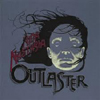 There has never been an album by Nina Nastasia I didn't like. Sure, I have my favorites, and on those my favorite songs, but I've never been disappointed. I also know what to expect in terms of her songwriting, which is always exceptional. The formula and style haven't varied much from record to record, though different elements are often accentuated. What I do notice is a steady refinement and ever increasing mastery of subtle details. Her introspective lyrics continue to explore the territories of friendship, love, longing, and loss, and her strong and powerfully feminine voice continues to elucidate deep emotional responses from within me.
There has never been an album by Nina Nastasia I didn't like. Sure, I have my favorites, and on those my favorite songs, but I've never been disappointed. I also know what to expect in terms of her songwriting, which is always exceptional. The formula and style haven't varied much from record to record, though different elements are often accentuated. What I do notice is a steady refinement and ever increasing mastery of subtle details. Her introspective lyrics continue to explore the territories of friendship, love, longing, and loss, and her strong and powerfully feminine voice continues to elucidate deep emotional responses from within me.
Part of the consistency from album to album comes from the great working relationship she has with engineer Steve Albini. All of her albums are suffused with the distinctive warmth he is able to magically extract from all the instruments, especially the strings. Drummer Jim White, of Dirty Three fame, has also contributed expert percussive rhythms to a number of her records. White doesn’t make an appearance on Outlaster but the drums are just as deftly employed by Jay Bellerose. The entire set up across these ten songs is unique, as she works with a string quartet, a wind quartet, and a trio. Paul Bryan who plays piano and electric bass in the trio was also responsible for the conducting and arrangements of the songs. Sometimes the addition of orchestral elements can make a record bombastic and overbearing. This is certainly not the case here. All the components are married together perfectly.
The disc opens with the elegiac "Cry, Cry Baby," beginning with soft strumming and gentle voice. Bluegrass infused cello bowing underscore is given a moment to shine by itself, before she sings out "you're my only true love" while the violins soar into the higher registers, the electric guitar whispering quiet lines along the edge of the song. Nina is great at writing short songs, often having several on an album that clock in at under two minutes. For all their brevity, they are often the most poignant and powerful of all. I think of them as extended haikus, rich with imagery that burns in a powerful flash. "Moves Away" is such a song, her energetic voice spinning a commanding melody.
The rhythm and pacing of the words bleeds over into the next song, the string quartet conjuring up motifs from previous songs. The joy for me on "You're a Holy Man," however, is delicate flourishes of the quick French horn which place the song in another orbit. It is hard to pick a favorite piece but when I'm not listening to the album straight through, I return to "You Can Take Your Time," which would be a good choice for a mix tape or to play as part of a radio set. It gives me the shivers, especially verses like, "do you think I judge you / tell me how it looks to love you / I am not a stranger / I know you well."
"The Familiar Way" has an enjoyable flamenco flair, recalling similar elements in the work of Matt Elliott on albums like Failing Songs and Howling Songs. In the lyrics she references her own previous masterpiece The Blackened Air, an album that has held up considerably well over the years. Things reach a midway climax on the following "What's Out There," where the string section collapses at one point into a frittering display of plucking, effectively capturing the sound of broken clocks, and jarring springs. The second to last song, "One Way Out," is another brilliant short tune: the lyrics are minimal but her voice is most gorgeous and tender at this point, demonstrating the great range she is capable of. The title track tops things off with a wondrous evocation of sailing across the sea. It starts with cymbal taps that are almost imperceptibly ring modulated. The wind section is sonorous, as if the exhaled air of the players is tinkling the caressing strings of bells. Things fade out in a peaceful lull.
samples:
 
Read More


